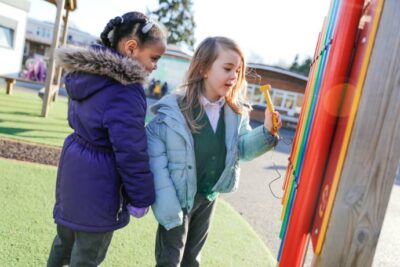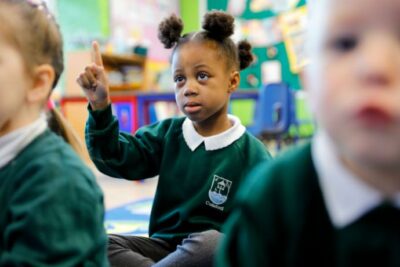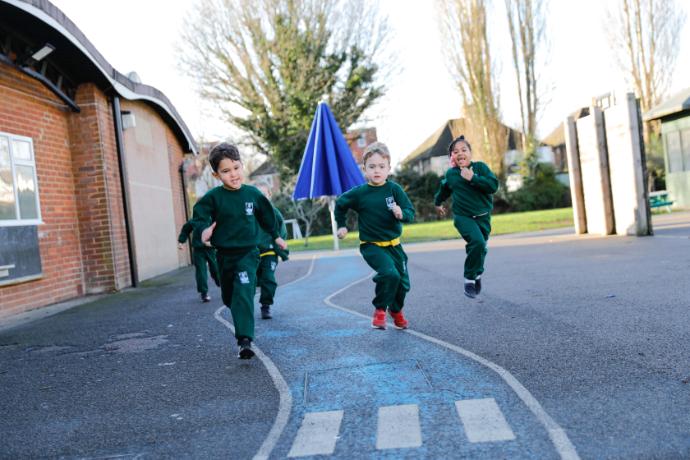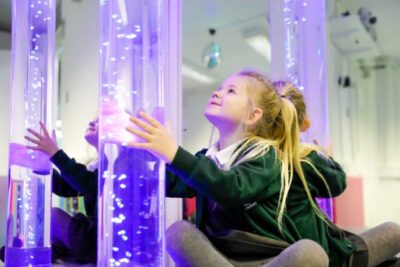Coteford Infant School Achieves Flagship
June 20, 2023
Coteford Infant School has achieved the Inclusive School Award with Flagship status.
Pupils Fully Integrated With Their Peers
Coteford Infant School is in the London Borough of Hillingdon and has a mixed catchment area. It is just at the end of its journey of moving from a 3-form entry school to a 2 -form entry school. It is just Year 2 that is taught in 3 groups. The school does have Specialist Resources Provision (SRP) funding for up to 10 pupils with a physical difficulty. These pupils are fully integrated with their peers. School data shows 27.16% of the pupils are Pupil Premium (PP), 27.16% English as an Additional Language (EAL) and 26.29% Special Educational Needs and Disability (SEND), with 17 pupils having Education and Health Care Plans (EHCPs). Early Support Funding has been agreed for 3 pupils and applications are in process for a further 4 more pupils.

The school’s wide corridors and single-storey building make it easily accessible for children with physical difficulties and wheelchair users. Children’s wheelchairs and equipment can be seen around the school outside and inside classrooms where again there is ample space for movement and storage.
Happy Feet
There is consistency across the school with the use of Zones of Regulation and Happy Feet. Zones of Regulation are used from Nursery through to Year 2, with Nursery pupils just understanding a basic range of feelings whilst once they are in Year 2, they have additional words to describe their feelings, so the language is adapted for each class. Parents know about Zones of Regulation and are given resources to use at home when appropriate. The real strength is that the pupils know that it is ok to be in the Red Zone and that they are supported in thinking about what steps they can take to help them to feel better.
Happy Feet is a restorative justice intervention. In each classroom and outside in the playground, two pairs of feet, facing each other, are painted on the floor. When the pupils feel unhappy with something another pupil has done, they are encouraged to stand on the feet and talk things out. The pupils told our Assessor that they find this helpful. Staff said that other pupils, seeing a bit of a disagreement or upset, would encourage children to go and stand on the feet and talk. Yes, there is times when adult support is needed but pupils can resolve things themselves.
On the school tour, our Assessor saw a range of activities available for the pupils in the Nursery, both inside and out. All activities were linked to The Very Hungry Caterpillar. There was a small group sitting with the teacher learning about the life cycle of a butterfly whilst outside for example, a group was making caterpillars. The children had soft toys and were happy to talk about the hungry caterpillar. The teacher spoke about the needs of the pupils who attended Nursery full-time. She said that as they needed further stimulation, she had created Challenge Baskets for them that had puzzles, pictures and CVC word making cards.
Calmness
At the start of the IQM tour, the school was moving from mixed Read Write Inc groups back to their normal class. This was done quickly and calmly. It was impressive to see Reception pupils moving back into their class and sitting down quietly on the carpet. In one class our Assessor was told there is a high level of need, but this was not obvious from the behaviour. Hand singles are used to further support calm movement. One finger held up means, stand up, while two fingers held up means, walk.
The calmness continued as our Assessor visited the other year groups. All classes have Zones of Regulation displays and visual timetables are displayed and used so that pupils know what has finished and what is coming next. In one class, our Assessor observed direct teaching of the Rights Respecting Charter. The teacher was supported by a pupil and the responses from the class showed that they understood the responsibility teachers have and that they as pupils have rights.
Our Assessor was very fortunate to be able to see a class out experiencing forest school activities. There is a large fire pit area with wooden walls around it and a canopy over the top. Staff were very pleased by this addition as it means the area can be used in bad weather. The pupils were out making ice cream cones. Some were just engaged in filling their own cones whilst others were involved in role play as they had created an ice cream parlour where they were selling ice creams in brightly coloured containers. Other children were just making good use of the space, using the tyre swing, and exploring the area. It was obvious that all the pupils were enjoying the activity. Leaving that area, our Assessor walked through the sensory garden which again offers different stimulation and interest to the pupils.
Pupil Progress Regularly Reviewed
The Ladybird Class has been set up for a group of identified children for support in English and Maths. Currently there are 8 Year 1 pupils and 3 Year 2 pupils who join this class for the mornings on Monday to Thursday. A differentiated Year 1 curriculum is offered, and the different learning needs of the pupils are considered. In some ways it has the feel of an Early Years Foundation Stage (EYFS) class with a range of activities and the focus on play. There are individual work stations set up for those pupils that need it, and good use is made of visuals. This is the first year of this class. Pupil progress is regularly reviewed and the SENDCo and Higher-Level Teaching Assistant (HLTA) who lead the group are reflective, considering how to adapt and develop the work of the group. It is the needs of the pupils that is at the centre of the work.

The school is fortunate to have space given that it was once a 3-form entry. This means that there is ample room for interventions. Our Assessor was lucky to be in on the day when the dog therapist Star was in. She is currently based in an office but the plan for next year is for the therapy to be moved to a bigger area. Star’s owner explained that Star knows the children. She knows those who like to be livelier and those who are quieter, when she may just lie on the floor near them. The first pupil she was seeing that morning would be brushing Star’s ears. During the day our Assessor saw Star walking around the school and heard children speaking to her. The pupils know that they must ask her owner first before touching her.
Well-equipped Sensory Room
The school has a well-equipped sensory room and the space used for physio visits has equipment that can be used for small group and 1:1 support. The Bumblebee room is a special place where small groups and individual pupils can be supported. The HLTA who runs the room is now Emotional Literacy Support Assistant (ELSA) trained and can offer additional types of support. She has plans to develop one corner of the room so that it can be a calmer more reflective space as she feels that some pupils will benefit from this. Along with the Personal, Social, Health and Economic (PSHE) lead, she has created a small library there for staff, so that they can choose books that might support individuals in their class. This is a clear example of the team work that takes place in the school.
Staff spoken to were positive and enthusiastic. One person explained how the staff were a team. “We are one team. There is no difference, Headteacher, or lunch time helper.” The Headteacher values the staff. She has an open-door policy, and the Senior Leadership Team (SLT) follows her lead. The Headteacher gives staff opportunities to develop and shows she has confidence in her staff. Teachers and HLTAs agreed that pupils know their routines and that visuals are used to support when required. Individual need is recognised, and adaptions made when necessary. Reflection is a strength of the staff team. For example, our Assessor was told how the ELSA trained HLTA was planning on offering 10-minute meditations to staff at lunch time whilst other staff spoke about trialling activities and resources and then sharing those that had had a positive impact with the whole staff.
Safe at School
The pupils explained how they felt safe in the school. The teachers are very helpful and make lessons fun. They liked the trips they went on and spoke about trips to the Model Village and Windsor Castle. They said they have good friends and people to play with. Our Assessor saw them out at play. That morning there was music playing and so led by staff, some children stood near dancing, as did one girl in her wheelchair and then when Gangnam Style played, even the boys playing football joined in. It is a school favourite.

Parents can not speak highly enough of the school. One explained how she had taken time to decide about the right school for her child as she has complex needs and how right she had been to make the choice. Staff are prepared to meet with the ABA consultant that works with her daughter and are prepared to follow the suggestions that are made. Parents know that they are listened to and that teachers promote the idea that it is ok to be different. Staff are very focused and sensitive and always ready to offer support. Our Assessor was told that the school is unique in the way it works.
The Governor that was due to meet with with our Assessor was unwell but kindly agreed to speak on the phone. She explained that all the IQM priorities were embedded in the School Development Plan (SDP). She said how the ethos was all about the individual and how provision is adapted to meet the needs of individuals. The Governors are aware of the interventions that take place, and she was able to list them. She spoke about how Zones of Regulation has developed, and that progress can be seen. She mentioned how impressed she was about staff training in that all staff are trained and that expertise is shared with all.
Our Assessor added, “I was really pleased to be able to visit the school again and see how things had developed over the last year. This is a school where inclusion really does matter. There is no complacency here. It is testament to how the Headteacher inspires and motivates staff that they are always looking to develop and extend their provision for all.”
Find out more about the IQM Inclusive School Award
If your school is interested in obtaining the IQM Inclusive School Award or you wish to talk to a member of the IQM team please telephone:
028 7127 7857 (9.00 am to 5.00 pm)
or email: info@iqmaward.com for further details.
Want more information on the IQM Award? Click here to request your free IQM information pack.








